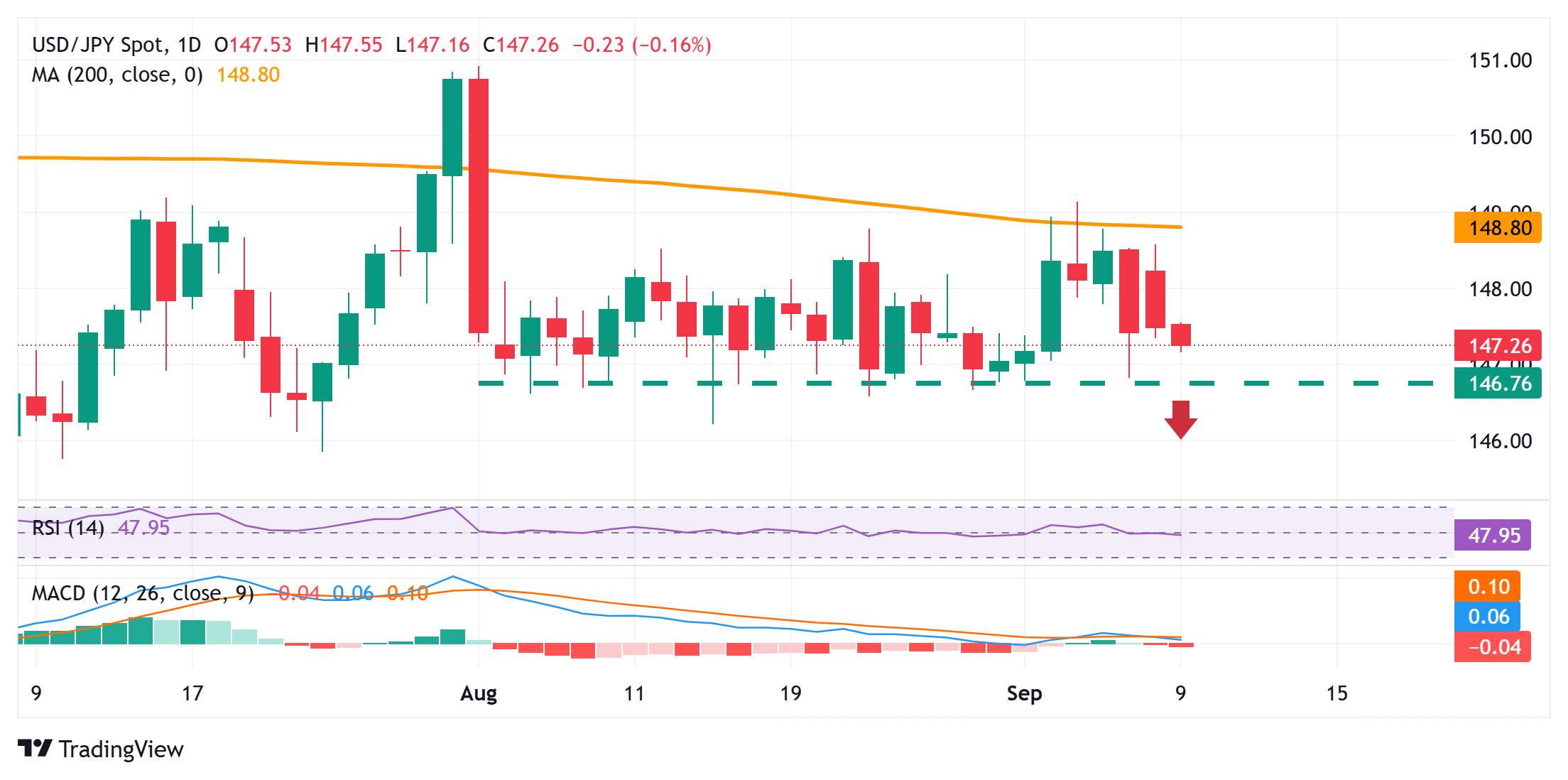Japanese Yen sticks to positive bias against USD amid divergent BoJ-Fed expectations
- The Japanese Yen continues with its relative outperformance despite political uncertainty.
- The incoming macro data from Japan reaffirmed BoJ rate hike bets and underpinned the JPY.
- Dovish Fed expectations weigh on the USD and also exert pressure on the USD/JPY pair.
The Japanese Yen (JPY) remains on the front foot against its American counterpart through the Asian session on Tuesday, though bulls lack conviction. US President Donald Trump signed an executive order last Thursday to lower the Japanese auto import tariff. Furthermore, an upward revision of Japan’s Q2 GDP growth figures, along with a rise in household spending and positive real wages, backs the case for an imminent interest rate hike by the Bank of Japan (BoJ). This marks a significant divergence in comparison to rising bets for a more aggressive policy easing by the US Federal Reserve (Fed), which contributes to the JPY’s relative outperformance against the US Dollar (USD).
Meanwhile, Japan’s Prime Minister Shigeru Ishiba announced his resignation over the weekend, fueling uncertainty, which may temporarily hinder the BoJ from normalising policy and hold back the JPY bulls from placing aggressive bets. Apart from this, the upbeat market mood turns out to be another factor that contributes to capping the upside for the JPY. Furthermore, the USD bears pause for a breather ahead of the latest US inflation figures – the Producer Price Index (PPI) and the Consumer Price Index (CPI) on Wednesday and Thursday, respectively. This, in turn, lends some support to the USD/JPY pair, though the fundamental backdrop seems tilted in favor of the JPY bulls.
Japanese Yen bulls seem reluctant amid positive risk tone
- Japan’s tariff negotiator Ryosei Akazawa said in an X post on Tuesday that US tariffs on Japanese goods, including cars and auto parts, are set to be lowered by September 16. US President Donald Trump’s signing of an executive order last Thursday formalized the U.S.-Japan trade deal and cleared uncertainties.
- The Cabinet Office reported on Monday that Japan’s economy expanded at an annualised 2.2% rate in the April-June period from the previous quarter, much faster than the initial reading of 1.0% growth. On a quarterly basis, GDP increased by 0.5% compared to a median forecast and the initial estimate of a 0.3% rise.
- This comes after data released on Friday showed that real wages in Japan turned positive for the first time in seven months. This, along with a further rise in household spending, keeps hopes alive for an imminent interest rate hike by the Bank of Japan (BoJ) and continues to offer some support to the Japanese Yen.
- Japan’s Prime Minister Shigeru Ishiba announced over the weekend that he will step down as President of the ruling Liberal Democratic Party (LDP). This adds a layer of uncertainty, which could temporarily hinder the BoJ from normalising policy and hold back the JPY bulls from positioning for any meaningful upside.
- Meanwhile, the US Dollar continues with its struggle to attract any meaningful buyers and touches a fresh low since July 28 during the Asian session on Tuesday amid bets for a more aggressive policy easing by the Federal Reserve. In fact, traders are pricing in a small possibility of a jumbo interest rate cut later this month.
- Moreover, the US central bank could lower borrowing costs three times by the year-end. The expectations were boosted by the US employment details released on Friday, which provided further evidence of a softening US labor market. This marks a significant divergence in comparison to hawkish BoJ and favors the JPY bulls.
- The US Bureau of Labor Statistics will publish the preliminary estimate of the annual revision of Nonfarm Payrolls later today, which might drive the USD and the USD/JPY pair. The focus will then shift to the US Producer Price Index (PPI) and the Consumer Price Index (CPI), due on Wednesday and Thursday, respectively.
USD/JPY bears await sustained break below 146.80-146.70 support

The overnight failure ahead of the very important 200-day SMA barrier and a subsequent slide below the 148.00 mark favor the USD/JPY bears. Moreover, oscillators on the daily chart have again started gaining negative traction and suggest that the path of least resistance for spot prices is to the downside. Hence, some follow-through selling below the 147.00 mark, leading to a subsequent break through the 146.80-146.70 horizontal support, will reaffirm the negative bias and expose the August swing low, around the 146.20 region, before the pair eventually drops to the 146.00 mark.
On the flip side, the Asian session high, around the 147.50-147.55 area, now seems to act as an immediate hurdle. A sustained strength beyond might trigger a short-covering move and allow the USD/JPY pair to reclaim the 148.00 mark. The momentum could extend further, though it runs the risk of fizzling out rather quickly near the 200-day SMA barrier, around the 148.75 zone. This is closely followed by the 149.00 round figure and the 149.20 area, or a one-month high touched last week, which, if cleared, might shift the near-term bias in favor of bulls. Spot prices might then climb to the 150.00 psychological mark and then aim to challenge the August monthly swing high, around the 151.00 neighborhood.




